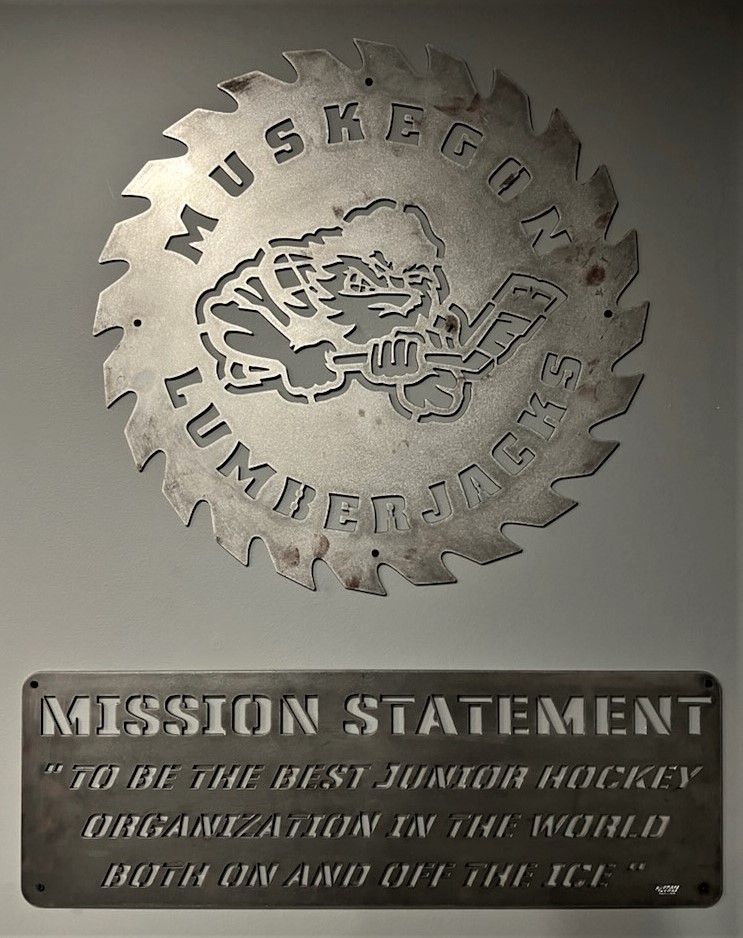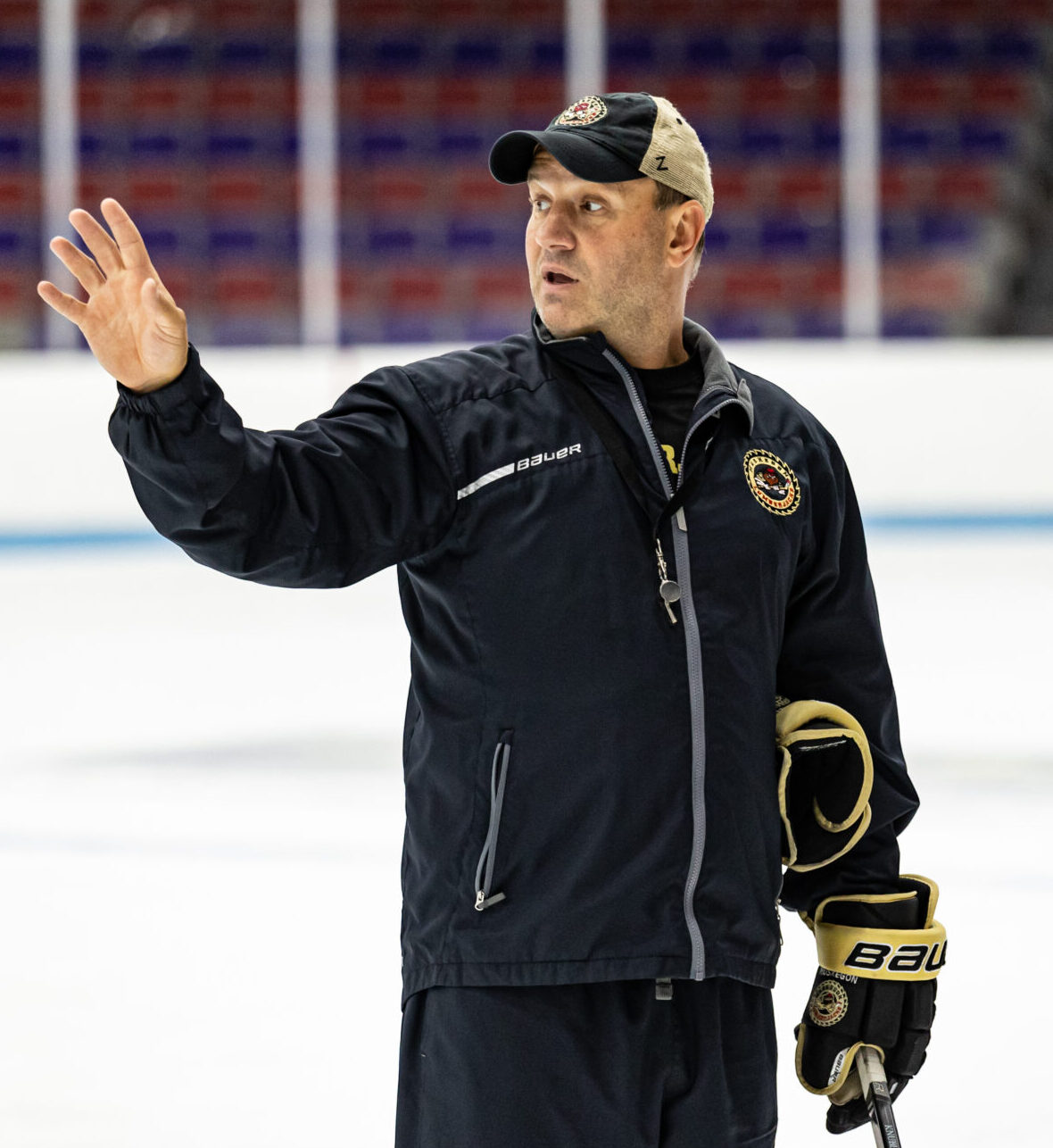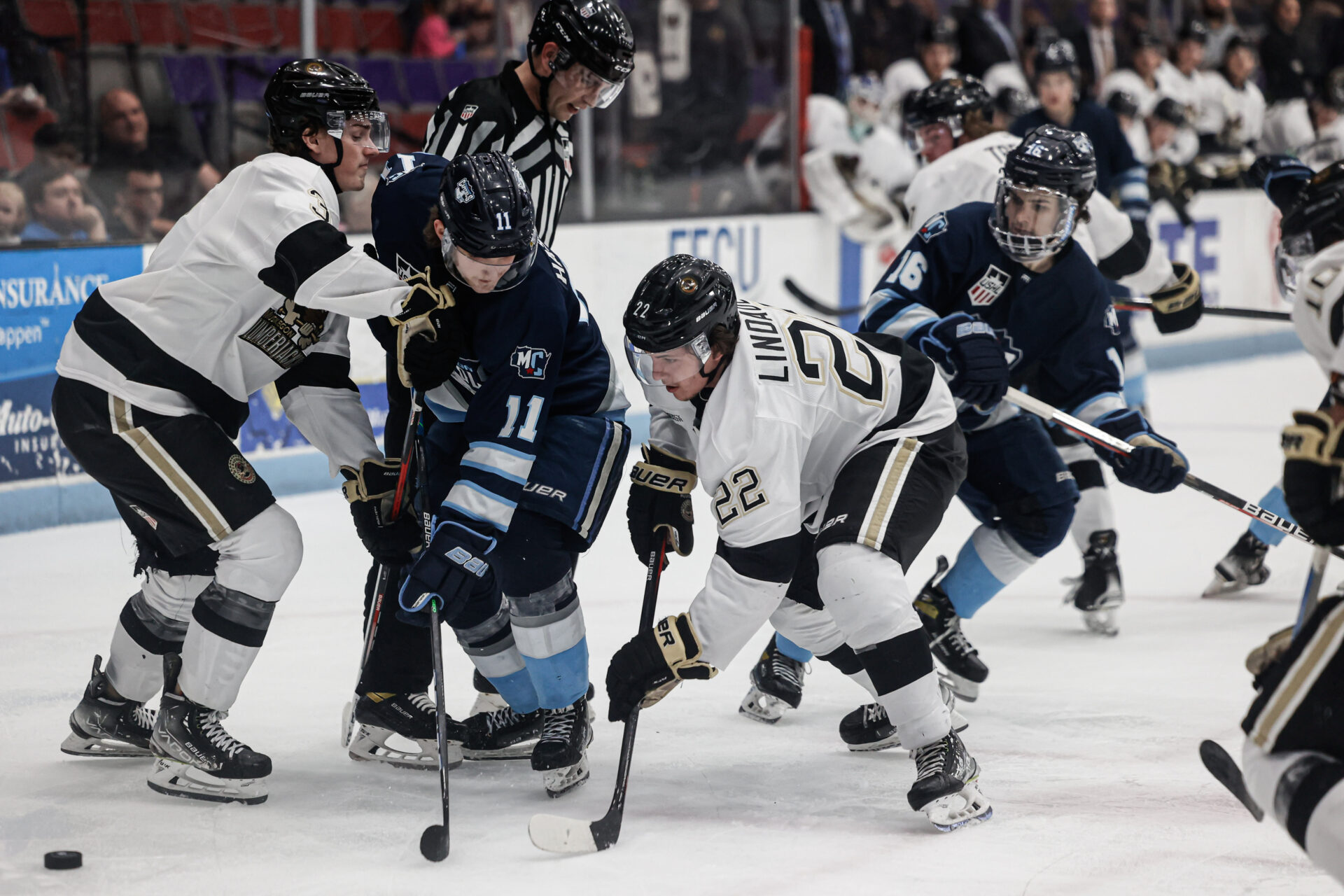MUSKEGON – When you look at the Muskegon Lumberjacks today, playing in front of big crowds at the renovated and still evolving Trinity Health Arena, it might be easy to forget what kind of shape the franchise was in back in 2015.
Simply put, it was not very good.
The team played at the aging and drab L.C. Walker Arena, fan support was hit-and-miss, and there were lots of empty seats in the building throughout every season.
The Lumberjacks, owned at the time by two sets of brothers from another state, were put up for sale in 2015 and the list of prospective buyers was short.
The Jacks may not have survived to play the next season if Dan Israel, a Detroit-area asphalt contractor with a passion for elite junior hockey, had not purchased them at the last minute in August 2015, just weeks before training camp.
“It was an inch from the grave,” said Israel, who was a hockey dad and coached at the youth level in the Detroit area for 10 years. “It had one foot in. That’s a fact. To be honest, if I had known that I could have got it for less money.”

Forward to 2023, and the Lumberjacks are a very solid franchise, on and off the ice. The team has advanced to the Eastern Conference finals in the Clark Cup playoffs for three straight seasons, Trinity Health Arena is now a renovated and modern hockey venue, and weekend crowds for home games have been large and enthusiastic.
Big improvements occurred under Israel’s ownership, which ended in December when he sold the team to Peter Herms, a New Jersey businessman who played some minor league professional hockey in his youth, including a short stint with the old Muskegon Lumberjacks.
Israel was a passionate owner who loved the Lumberjacks and expected to keep the team for a few more years while he continued to chase his dream of a Clark Cup championship.
But the Lumberjacks had increased in value since he bought the team, an unexpected offer came from Herms, and Israel, along with co-owner Bob Kaiser, decided to sell and move on.
“I was not trying to sell the hockey team,” Israel said. “I wanted to win a championship. But then (Herms) came along, made an offer that was very attractive, and it was a business decision.
“I really wanted to win a championship, and I think that will happen within the next 24 months. I will be a little jealous.”
Israel said he spent a lot of time talking to the new owner and making sure Herms was the right person to continue the progress that’s been made.
“If he was just a father looking for a place for his son to play, I don’t think I would have sold it to him for any amount of money,” he said. “I think he’s an ethical, high-character guy, and I have every confidence that he will continue to improve on what we’ve built.”
Changing the culture
If the Lumberjacks continue to be successful into the future, Israel will deserve a lot of credit, because he did not just purchase and preserve a franchise that was on the verge of collapse – he changed every aspect of the organization, for the better.
Early on, he created a company mission statement that was put on display throughout the arena: “To be the best junior hockey organization in the world, on and off the ice.”
He was sometimes relentless in his approach, and certainly ruffled some feathers when he came to town, candidly telling lots of employees that the status quo was not good enough and they had to do much better.
“It was hard, but we had to change the entire culture of the organization, from the business office to hockey operations,” Israel said. “I did take a stern approach. It needed a culture shock. I felt an obligation to the community and myself to turn it around.”
Lots of personnel changes were made over the years as Israel searched to find the management team that could implement his vision for the franchise.

On the hockey side, he went through several general managers and head coaches.
After the departure of longtime general manager John Vanbiesbrouck, Israel hired and then parted company with former Chicago Steel general manager Ryan Bennett, then hired Steve Lowe as president of hockey operations.
Lowe, the former general manager of the USHL’s Tri-City Storm who helped that team become a perennial power in the Western Conference, was brought to Muskegon to have the same impact.
Israel also went through several head coaches, including Todd Krygier and John LaFontaine, before settling on Mike Hamilton, who served behind the Jacks’ bench for 4 ½ seasons before leaving the team in December.
Lowe and Hamilton produced what Israel was looking for – a winner. The Jacks have qualified for the USHL playoffs for five straight seasons and have advanced to the Eastern Conference finals for three straight seasons.
Record-wise, the team’s best mark in the Israel era was 2018-19, when the Jacks were 41-17-5 in the regular season and won the Eastern Conference title. They were also very good in the COVID-shortened 2020-21 campaign, posting a 34-16-4 regular season record.

Israel was also impatient on the business side, going through several presidents of business operations, including Rob Murphy, Tim Taylor and Mike McCall, before finally settling on Andrea Rose.
Rose and her young staff have worked hard to improve the entertainment value of Lumberjacks games, and attendance has steadily increased.
Israel said the leadership changes were never personal.
“I did go through coaches,” he said. “But I got a call from John LaFontaine just recently, and Todd Krygier and I are still friends. I have good relationships to this day with them and Mike Hamilton.
“We got lucky with Coach Hamilton and Andrea Rose, and Steve Lowe is very good at what he does. We finally had it all together.”
Rose recognizes and respects what Israel did to modernize and improve the entire Lumberjacks organization.
“I admire Dan’s work ethic and the lessons he’s taught me over the years, both personally and professionally,” Rose said. “He instilled a commitment to excellence in the culture of our team and was always quick to lend words of wisdom.
“I’m grateful for his belief in me, and more importantly, his belief in Muskegon.”
Improving the arena, getting past COVID
Israel and his partner Kaiser played a huge role in renovating the downtown arena, which went from being called L.C. Walker Arena to Mercy Health Arena and now Trinity Health Arena within in a few short years.
The two owners worked with the city, and invested a lot of their own money, to get the renovations done. When the facelift was completed on time for the 2018-19 season, the once dreary old building that had far too many seats and lacked any sort of charm or amenities had been transformed into a cozy, fan-friendly hockey arena.
The number of seats was dramatically decreased to create a more intimate environment. Other improvements included the addition of party decks, a beer garden, and private box suites for small groups that offer high-end food and beverage service.
“I thought we needed a makeover for the building,” Israel said. “We needed to make it more fan-friendly, not just about hockey but about entertainment. (Former Muskegon City Manager) Frank Peterson and I worked together and I think it came out good. It needed more than just a paint job, and now Muskegon has one of the best junior hockey venues in the world, and it’s because of what we and the city invested.”

Israel may have faced his biggest challenge in 2020, when the nation was shut down by the COVID pandemic. The USHL ended its 2019-20 season early due to the emergency, then resumed operations late in the fall of 2020, but fans were not allowed at games.
Having no ticket revenue virtually guaranteed that teams would lose money. They league offered the owners an out, telling them they could skip 2020-21 and come back with full membership the following season.
Israel and Kaiser decided to put a team on the ice, anyway, and accept the financial losses. They wanted to keep their commitment to the young players who were developing their skills with the Lumberjacks, and they thought it was important for the Jacks to compete and provide a diversion for the community, at least through media reports.
That decision kept the 70-year tradition of professional or Tier 1 junior hockey alive and uninterrupted in Muskegon.

“We 100 percent took a financial bath,” Israel said about that COVID season. “We did it for the kids who were playing, and we also felt like shutting it down might hurt the value of the franchise. If I had to do it again, I would do the same thing.”
An emotional Israel returned to Muskegon for the final two homes games of calendar year 2022, after the sale of the team was completed. He walked around the arena, shaking hands with old friends and fans and giving everyone a heartfelt goodbye.
Israel did not get his Clark Cup championship, but departed with the knowledge that the organization he left was far better than what he purchased.
“In the beginning I was stern-faced and very determined, then as time went by it was an incredible joy for me to see the fans of Muskegon cheering on what was created,” he said. “I felt like I was almost part of the community. Every time I walked into the arena, I felt good inside. We did something great for this town.” 
Leave a comment
COMMENTS POLICY: We have no tolerance for messages of violence, racism, vulgarity, obscenity or other such discourteous behavior. Thank you for contributing to a respectful and useful online dialogue.